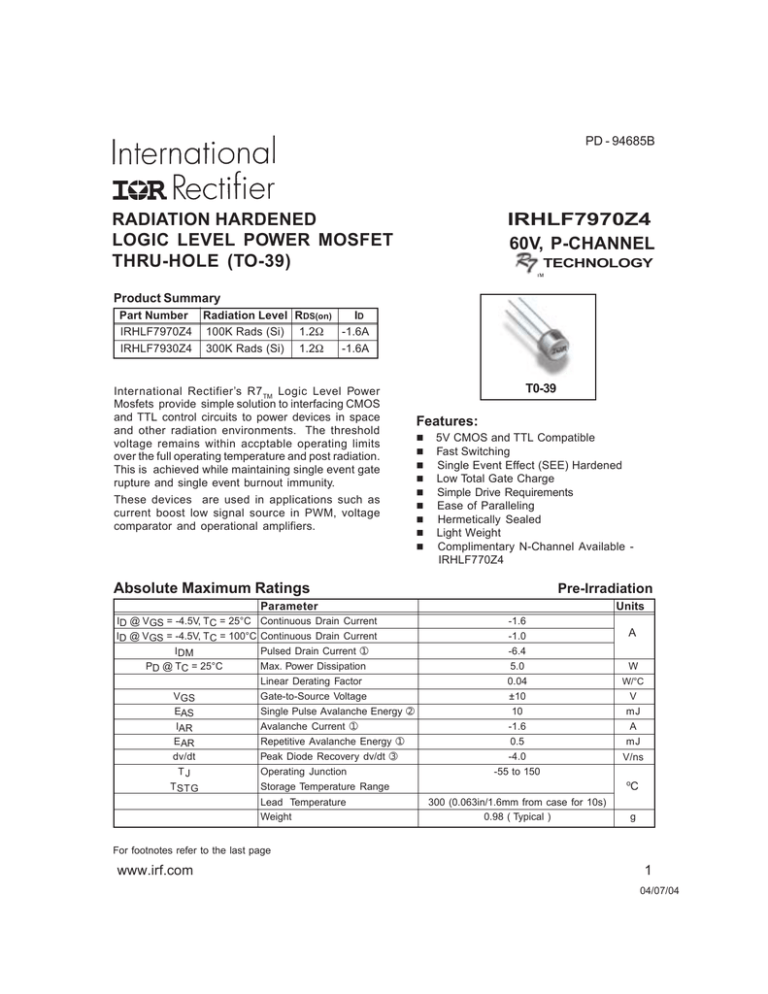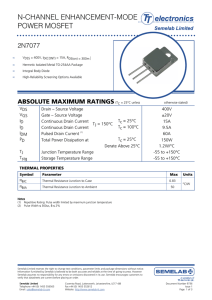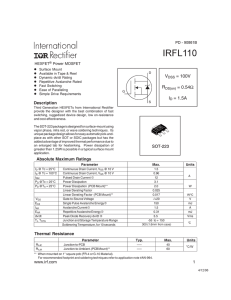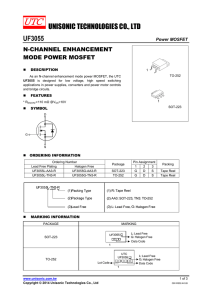radiation hardened irhlf7970z4 logic level power mosfet thru-hole
advertisement

PD - 94685B RADIATION HARDENED LOGIC LEVEL POWER MOSFET THRU-HOLE (TO-39) IRHLF7970Z4 60V, P-CHANNEL TECHNOLOGY c Product Summary Part Number Radiation Level RDS(on) ID IRHLF7970Z4 100K Rads (Si) 1.2Ω -1.6A IRHLF7930Z4 300K Rads (Si) 1.2Ω -1.6A International Rectifier’s R7 TM Logic Level Power Mosfets provide simple solution to interfacing CMOS and TTL control circuits to power devices in space and other radiation environments. The threshold voltage remains within accptable operating limits over the full operating temperature and post radiation. This is achieved while maintaining single event gate rupture and single event burnout immunity. These devices are used in applications such as current boost low signal source in PWM, voltage comparator and operational amplifiers. T0-39 Features: n n n n n n n n n 5V CMOS and TTL Compatible Fast Switching Single Event Effect (SEE) Hardened Low Total Gate Charge Simple Drive Requirements Ease of Paralleling Hermetically Sealed Light Weight Complimentary N-Channel Available IRHLF770Z4 Absolute Maximum Ratings Pre-Irradiation Parameter ID @ VGS = -4.5V, TC = 25°C ID @ VGS = -4.5V, TC = 100°C IDM PD @ TC = 25°C VGS EAS IAR EAR dv/dt TJ T STG Continuous Drain Current Continuous Drain Current Pulsed Drain Current ➀ Max. Power Dissipation Linear Derating Factor Gate-to-Source Voltage Single Pulse Avalanche Energy ➁ Avalanche Current ➀ Repetitive Avalanche Energy ➀ Peak Diode Recovery dv/dt ➂ Operating Junction Storage Temperature Range Lead Temperature Weight Units -1.6 -1.0 -6.4 5.0 0.04 ±10 10 -1.6 0.5 -4.0 -55 to 150 A W W/°C V mJ A mJ V/ns o C 300 (0.063in/1.6mm from case for 10s) 0.98 ( Typical ) g For footnotes refer to the last page www.irf.com 1 04/07/04 IRHLF7970Z4 Pre-Irradiation Electrical Characteristics @ Tj = 25°C (Unless Otherwise Specified) Parameter Min Drain-to-Source Breakdown Voltage -60 — — V — -0.06 — V/°C — — 1.2 Ω VGS = -4.5V, ID = -1.0A ➃ -1.0 1.0 — — — — — — -2.0 — -1.0 -10 V S( ) — — — — — — — — — — — — — — — — — — — 7.0 -100 100 4.0 1.5 1.8 18 20 15 25 — VDS = VGS, ID = -250µA VDS = -10V, IDS = -1.0A ➃ VDS= -48V ,VGS=0V VDS = -48V, VGS = 0V, TJ =125°C VGS = -10V VGS =10V VGS = -4.5V, ID = -1.6A VDS = -30V ∆BV DSS /∆T J Temperature Coefficient of Breakdown Voltage RDS(on) Static Drain-to-Source On-State Resistance VGS(th) Gate Threshold Voltage g fs Forward Transconductance IDSS Zero Gate Voltage Drain Current IGSS IGSS Qg Q gs Q gd td(on) tr td(off) tf LS + LD Gate-to-Source Leakage Forward Gate-to-Source Leakage Reverse Total Gate Charge Gate-to-Source Charge Gate-to-Drain (‘Miller’) Charge Turn-On Delay Time Rise Time Turn-Off Delay Time Fall Time Total Inductance Typ Max Units Ω BVDSS µA nA nC ns Test Conditions VGS = 0V, I D = -250µA Reference to 25°C, ID = -1.0mA VDD = -30V, ID = -1.6A, VGS =-4.5V, RG = 24Ω nH Measured from Drain lead (6mm /0.25in from package) to Source lead(6mm/0.25in from packge)with Source wire internally bonded from Source pin to Drain pad C iss C oss C rss Input Capacitance Output Capacitance Reverse Transfer Capacitance — — — 177 40 8.0 Rg Gate Resistance — 28 — — — — pF VGS = 0V, VDS = -25V f = 1.0MHz Ω f = 5.0MHz, open drain Source-Drain Diode Ratings and Characteristics Parameter Min Typ Max Units IS ISM VSD t rr Q RR Continuous Source Current (Body Diode) Pulse Source Current (Body Diode) ➀ Diode Forward Voltage Reverse Recovery Time Reverse Recovery Charge ton Forward Turn-On Time — — — — — — — — — — -1.6 -6.4 -5.0 50 50 Test Conditions A V ns nC Tj = 25°C, IS = -1.6A, VGS = 0V ➃ Tj = 25°C, IF =-1.6A, di/dt ≤ -100A/µs VDD ≤ -25V ➃ Intrinsic turn-on time is negligible. Turn-on speed is substantially controlled by LS + LD. Thermal Resistance Parameter RthJC Junction-to-Case Min Typ Max Units — — 25 Test Conditions °C/W Note: Corresponding Spice and Saber models are available on International Rectifier Web site. For footnotes refer to the last page 2 www.irf.com Radiation Characteristics Pre-Irradiation IRHLF7970Z4 International Rectifier Radiation Hardened MOSFETs are tested to verify their radiation hardness capability. The hardness assurance program at International Rectifier is comprised of two radiation environments. Every manufacturing lot is tested for total ionizing dose (per notes 5 and 6) using the TO-3 package. Both pre- and post-irradiation performance are tested and specified using the same drive circuitry and test conditions in order to provide a direct comparison. Table 1. Electrical Characteristics @ Tj = 25°C, Post Total Dose Irradiation ➄➅ Parameter BVDSS VGS(th) IGSS IGSS IDSS RDS(on) VSD 100K Rads(Si)1 Min Max Drain-to-Source Breakdown Voltage Gate Threshold Voltage Gate-to-Source Leakage Forward Gate-to-Source Leakage Reverse Zero Gate Voltage Drain Current Static Drain-to-Source ➃ On-State Resistance (TO-39) Diode Forward Voltage ➃ 300KRads(Si)2 Min Max Units -60 -1.0 — — — — — -2.0 -100 100 -1.0 1.2 -60 -1.0 — — — — — -2.0 -100 100 -10 1.2 nA — -5.0 — -5.0 V V µA Ω Test Conditions VGS = 0V, ID = -250µA VGS = VDS, ID = -250µA VGS =-10V VGS = 10 V VDS=-48V, VGS =0V VGS = -4.5V, ID =-1.0A VGS = 0V, IS = -1.6A 1. Part number IRHLF7970Z4 2. Part number IRHLF7930Z4 International Rectifier radiation hardened MOSFETs have been characterized in heavy ion environment for Single Event Effects (SEE). Single Event Effects characterization is illustrated in Fig. a and Table 2. Table 2. Single Event Effect Safe Operating Area Ion LET Energy Range VDS (V) (MeV) (µm) 0V 2V 4V 5V 6V 7V 8V 10V Br 37.9 285 36.8 -60 -60 -60 -60 -60 -50 -35 -25 I 59.9 345 32.7 -60 -60 -60 -60 -60 -20 - - Au 82.3 357 28.5 -60 -60 -60 -60 - - - - VDS (MeV/(mg/cm2)) @VGS= @VGS= @VGS= @VGS= @VGS= @VGS= @VGS= @VGS= -70 -60 -50 -40 -30 -20 -10 0 Br I Au 0 2 4 6 8 10 12 VGS Fig a. Single Event Effect, Safe Operating Area For footnotes refer to the last page www.irf.com 3 IRHLF7970Z4 10 VGS TOP -10V -7.5V -5.0V -4.0V -3.5V -3.0V -2.5V BOTTOM -2.25V 1 -2.25V 60µs PULSE WIDTH Tj = 25°C 1 10 1 60µs PULSE WIDTH Tj = 150°C 0.1 100 10 2.0 RDS(on) , Drain-to-Source On Resistance (Normalized) -I D , Drain-to-Source Current ( Α) T J = 25°C T J = 150°C 1 VDS = -25V 15 60µs PULSE WIDTH 0.1 3 4 5 6 7 -V GS, Gate-to-Source Voltage (V) Fig 3. Typical Transfer Characteristics 4 10 100 Fig 2. Typical Output Characteristics Fig 1. Typical Output Characteristics 2 1 -VDS , Drain-to-Source Voltage (V) -VDS , Drain-to-Source Voltage (V) 1 -2.25V 0.1 0.1 0.1 VGS -10V -7.5V -5.0V -4.0V -3.5V -3.0V -2.5V BOTTOM -2.25V TOP -I D , Drain-to-Source Current (A) -I D , Drain-to-Source Current (A) 10 Pre-Irradiation 8 ID = -1.6A 1.5 1.0 0.5 0.0 -60 -40 -20 VGS = -4.5V 0 20 40 60 80 100 120 140 160 TJ , Junction Temperature ( °C) Fig 4. Normalized On-Resistance Vs. Temperature www.irf.com Pre-Irradiation 250 12 -VGS , Gate-to-Source Voltage (V) VGS = 0V, f = 1MHz Ciss = Cgs + Cgd , Cds SHORTED Crss = Cgd Coss = Cds + Cgd 200 C, Capacitance (pF) IRHLF7970Z4 Ciss 150 100 C oss 50 C rss VDS = -48V VDS = -30V VDS = -12V 10 8 6 4 2 FOR TEST CIRCUIT SEE FIGURE 13 0 0 1 10 0 100 1 2 3 4 5 QG , Total Gate Charge (nC) -VDS , Drain-to-Source Voltage (V) Fig 6. Typical Gate Charge Vs. Gate-to-Source Voltage Fig 5. Typical Capacitance Vs. Drain-to-Source Voltage 10 10 OPERATION IN THIS AREA LIMITED BY RDS(on) -I D , Drain-to-Source Current (A) -I SD , Reverse Drain Current ( Α) ID = -1.6A T J = 150°C T J = 25°C 1 VGS = 0V 0.1 0 1 2 3 4 5 6 -VSD , Source-to-Drain Voltage (V) Fig 7. Typical Source-Drain Diode Forward Voltage www.irf.com 100µs 1 1ms 0.1 7 Tc = 25°C Tj = 150°C Single Pulse 1 10ms 10 100 1000 -VDS , Drain-to-Source Voltage (V) Fig 8. Maximum Safe Operating Area 5 IRHLF7970Z4 Pre-Irradiation 1.6 RD VDS VGS -I D , Drain Current (A) 1.3 D.U.T. RG - + 1.0 V DD VGS Pulse Width ≤ 1 µs Duty Factor ≤ 0.1 % 0.6 Fig 10a. Switching Time Test Circuit 0.3 td(on) tr t d(off) tf VGS 10% 0.0 25 50 75 100 125 150 TC , Case Temperature ( ° C) 90% Fig 9. Maximum Drain Current Vs. Case Temperature VDS Fig 10b. Switching Time Waveforms Thermal Response (Z thJC) 100 D = 0.50 10 0.20 0.10 0.05 0.02 0.01 1 PDM SINGLE PULSE (THERMAL RESPONSE) t1 t2 0.1 0.00001 Notes: 1. Duty factor D = t 1 / t 2 2. Peak T J = P DM x Z thJC + TC 0.0001 0.001 0.01 0.1 1 t1, Rectangular Pulse Duration (sec) Fig 11. Maximum Effective Transient Thermal Impedance, Junction-to-Case 6 www.irf.com Pre-Irradiation IRHLF7970Z4 L - D .U .T RG + IA S VGS -2 0V tp 25 VVDD DD A D R IV E R 0 .0 1 Ω 15V Fig 12a. Unclamped Inductive Test Circuit IAS EAS , Single Pulse Avalanche Energy (mJ) VDS ID -0.7A -1.0A BOTTOM -1.6A TOP 20 15 10 5 0 25 50 75 100 125 150 Starting TJ , Junction Temperature ( °C) Fig 12c. Maximum Avalanche Energy Vs. Drain Current tp V(BR)DSS Fig 12b. Unclamped Inductive Waveforms Current Regulator Same Type as D.U.T. QG 50KΩ -12V 12V .2µF .3µF -4.5V QGS QGD D.U.T. +VDS VGS VG -3mA Charge Fig 13a. Basic Gate Charge Waveform www.irf.com IG ID Current Sampling Resistors Fig 13b. Gate Charge Test Circuit 7 IRHLF7970Z4 Pre-Irradiation Footnotes: ➀ Repetitive Rating; Pulse width limited by maximum junction temperature. ➁ VDD = - 25V, starting TJ = 25°C, L= 8.0mH Peak IL = -1.6A, VGS = -10V ➂ I SD ≤ -1.6A, di/dt ≤ -170A/µs, VDD ≤ - 60V, TJ ≤ 150°C ➃ Pulse width ≤ 300 µs; Duty Cycle ≤ 2% ➄ Total Dose Irradiation with VGS Bias. -10 volt VGS applied and VDS = 0 during irradiation per MIL-STD-750, method 1019, condition A. ➅ Total Dose Irradiation with VDS Bias. -48 volt VDS applied and VGS = 0 during irradiation per MlL-STD-750, method 1019, condition A. Case Outline and Dimensions — TO-205AF (Modified TO-39) LEGEND 1- SOURCE 2- GATE 3- DRAIN IR WORLD HEADQUARTERS: 233 Kansas St., El Segundo, California 90245, USA Tel: (310) 252-7105 IR LEOMINSTER : 205 Crawford St., Leominster, Massachusetts 01453, USA Tel: (978) 534-5776 TAC Fax: (310) 252-7903 Visit us at www.irf.com for sales contact information. Data and specifications subject to change without notice. 04/2004 8 www.irf.com


